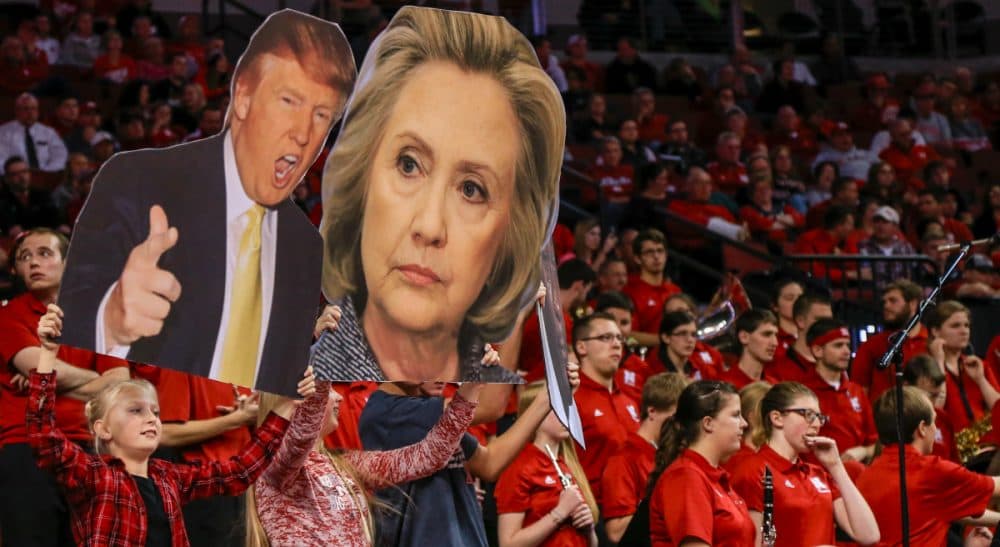Advertisement
Why This Republican Might Vote Democrat Next November

Self-described conservative Barton Swaim has a dirty secret: He likes Bernie Sanders. He really likes him.
He confessed his crush in a Los Angeles Times op-ed that deemed Sanders more aware than most politicians, Hillary Clinton in particular, that not everyone shares his views. Swaim bases this claim largely on Sanders’s use of prefatory phrases like “in my view,” as opposed to Clinton’s “I think” or “I believe.” (Yes, I’m underwhelmed by the distinction, too.) Of course, Swaim, an admired writer, hastens to clarify that “I would not vote for Sanders under any circumstance.”
I’m a registered Republican, and I could. Or for Clinton, come next November.
today’s Tea Party-dominated GOP reality has become [unreal]
Not over rhetorical quibbles, mind you. A revealing Politico survey of strategists and activists in both parties underscores the starkly different universes Democrats and Republicans inhabited. For me, it showed how unreal today’s Tea Party-dominated GOP reality has become.
The survey found that Democrats regard income inequality as the greatest economic problem facing the country. Republicans, by contrast, worry about economic growth — so much so that even the deficit came in a distant second. (Politico notes that its survey preceded the Paris terrorist attacks, which could elevate foreign policy in the presidential election.)
A Nevada Democrat explained the party’s worldview: “Democratic base voters see the country in stark terms: the small group at the top who’ve got it all, and everyone else struggling to make in in a country that won’t even guarantee them modest sick time or family leave.” But most Republicans “said growing the economy overall was more important than the other priorities listed” in the survey. “None of the 60 GOP insiders surveyed chose economic inequality as the most important issue.”
My party isn’t wrong to worry about economic growth. It’s essential to reducing the inequality that haunts Democrats. Progressives like Paul Krugman point out that economic growth vastly improved poor Americans’ living standards before the New Deal created a significant federal safety net. In recent decades, growth has lifted millions around the world out of poverty. Dumb liberals seem unaware of this, or else condemn growth as inevitably harmful to the environment. That’s wrong, and smart liberals — including Clinton and Sanders — acknowledge the need for entrepreneurship, which aids growth.
Advertisement
Yet Politico’s Republican respondents don’t grasp that growth can be jobs-less, and growth merely for growth’s sake is worthless. Krugman notes that while corporate earnings ultimately rebounded after the financial collapse, jobs didn’t, as companies sat on their money rather than hire workers, wary of wasting cash: Recession-battered consumers weren’t buying what the companies sold. Meanwhile, economic mobility, the American dream even conservatives prize, is no longer the norm in disadvantaged neighborhoods.
Once upon a time, Republicans understood that growth had to benefit average Americans. Abraham Lincoln believed fervently in private enterprise. But he knew from personal experience that capitalism generated inequality, and he thought government could ease that problem. (So did the pioneering free marketeer, Adam Smith.) Lincoln enacted free farmland for the poor and public universities for the working class, and he subsidized the transcontinental railroad to ensure economic development. It all worked.
Alone among today’s Republican candidates, Ohio Gov. John Kasich seems to share Lincoln’s and Smith’s wisdom. He expanded his state’s Medicaid program under Obamacare and defends the safety net. For now, Kasich languishes in the polls. The leading contenders think they know better than Lincoln and Smith.
to paraphrase conservative icon William Buckley, no one’s saying the Democrats are perfect, just better...
Donald Trump says Americans are overpaid. Marco Rubio commendably proposes tax cuts that would help low- and middle-income earners, but he’d replace Obamacare with inadequate measures and opposes the Dodd-Frank financial reforms, a hedge against financial collapse, and thus against inequality, that’s also pro-growth. Ben Carson also hates Obamacare and babbles half-baked tithing schemes. (More bad news if you’re one of those Republicans worried about the deficit: Pretty much every GOP candidate would swell it with tax cuts.)
The Democratic candidates have their shortcomings, certainly. But to paraphrase conservative icon William Buckley, no one’s saying the Democrats are perfect, just better — better at seeing our real economic problem, better at their willingness, occasionally, to take on knee-jerks in their own party who didn’t sit in the gifted section back in grade school. If things keep up like this, even a Republican might find that worth considering a year from now.
